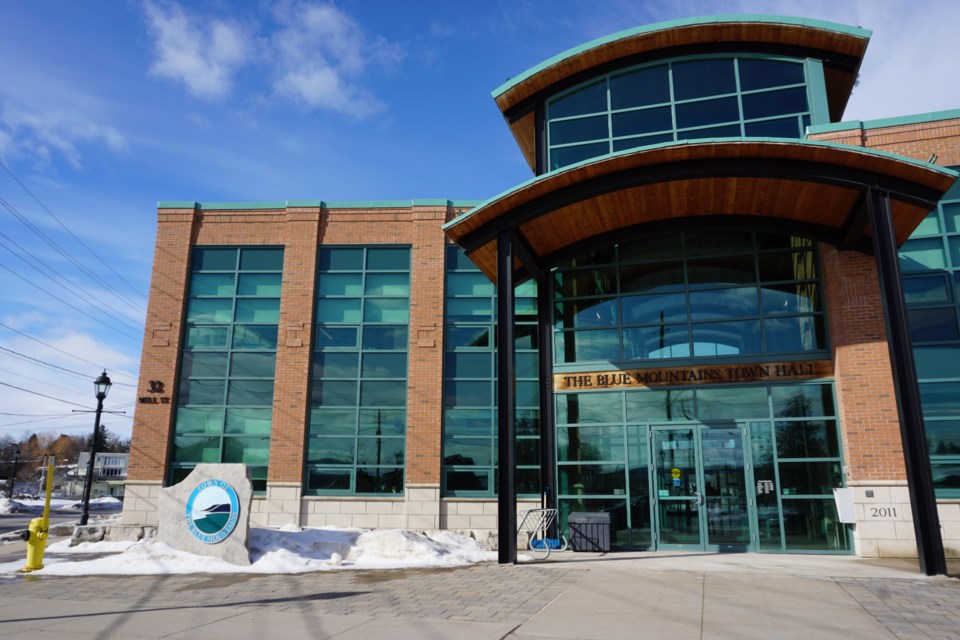The Town of the Blue Mountains (TBM) council has approved a 1.13 per cent increase for the 2021 residential tax rate over 2020.
The approved tax rate will result in an annual increase of $25 for the average home assessed at $620,000.
TBM council members conducted their final review of the proposed draft budget at a council meeting held on Monday.
The discussions were a continuation from the final budget-related Committee of the Whole meeting held in late January. At that time, the proposed budget outlined a 1.3 per cent increase to the levy.
In an effort to reduce the impact to the levy, on Monday council members made a few final cuts to the draft.
Council accommodations and mileage for 2021 in the amount of $10,000 was removed, as well as the $22,000 that had been allotted for lean training, a leadership training program for town staff.
In addition, the initial budget proposed the creation of a new communications role within town staff. Council voted to delay hiring for this position until July. `
The town’s stormwater hydraulic model development project was also moved from 2023 into the 2021 budget year as staff felt a lot of the work was overlapping as they moved through the town’s drainage master plan.
The stormwater hydraulic model development project is budgeted to cost $300,000 and will be funded in 2021 through roads and department charges.
Council members also voted in favour of splitting the funding for the fire master plan across two years - 2021 and 2022.
“The intention would be that the fire master plan would be getting finished in 2022,” said TBM CAO, Shawn Everitt. “The splitting of it does make sense as that project will be completed in 2022.”
Town staff also presented council with a list of additional ways the levy could be reduced, which included:
- Delay hiring of the fire prevention inspector until June - $34,800
- Removal of bridge repairs and maintenance as per the bridge and culvert asset management plan - $105,000
- Reduce recommended increased transfer to the bridge and culvert reserve fund as per the bridge and culvert asset management plan - $176,000
- Reduce recommended increased transfer to the various reserve funds as per the fleet asset management plan - $216,200
“I don't see anything frivolous on this list whatsoever. These are costs of operating the town,” said councillor Peter Bordignon. “These are things that I believe need to be done. Bridge repairs, the fire master plan – there are so many things that just are paramount to moving forward.”
Council voted in favour of leaving these items in the 2021 budget.
Council members also approved the inclusion of a part-time administrative assistant for $43,882, which is expected to be funded with revenues acquired through the short-term accommodation and licensing program.
“I really would like to see the volunteers who spend their time on those committees [of council] having consistent staff support when they need it,” said Councillor Andrea Matrosovs of the administrative role.
On Monday, TBM council was also asked to make additional room in the budget for a last-minute consideration from the Thornbury Business Improvement Association (BIA).
“We are asking council to partner with the BIA in this investment and approve $25,000 per year over the next three years,” stated George Matamoros, chair of the Thornbury BIA in a letter to council.
According to Matamoros, the funds will be put toward a downtown lighting project and the BIA has asked for the town’s assistance in order to keep the levy for local businesses below $1,000.
“People do want to see this lighting," said TBM Deputy Mayor, Rob Potter. "And we can expect BIA members, especially this year, to shoulder the whole cost. So anything we can do, I'm in support."
Through the budget process, TBM will be allocating $25,000 each year for the next three years to the BIA for a downtown lighting project.
Everitt added that staff will make every effort to look for alternative ways to fund the BIA’s ask instead of using taxation.
“This very clearly states that it is not necessarily tied to it being sourced from taxation and that council and staff can be creative in how that funding can be made available,” he said.
